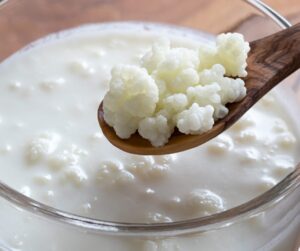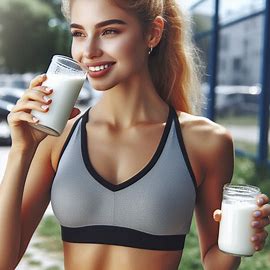https://youtu.be/1exK2kwtoDU
Nutrition plays a pivotal role in an athlete’s performance, recovery, and overall health. A huge nutritional powerhouse that is gaining popularity among athletes is fermented foods, particularly milk kefir. Originating from the mountainous region of the Caucasus, this tangy, yogurt-like beverage is not just a refreshing drink but a treasure trove of health benefits.
What is Milk Kefir?

Milk kefir is a fermented dairy product similar to yogurt and buttermilk. It’s a unique combination of milk and fermented kefir grains, teeming with beneficial probiotics that can greatly enhance health and well-being. But what sets kefir apart from other fermented dairy products is the type and quantity of the microorganisms it contains. The bacteria and yeast found in kefir grains are known for their health-promoting properties.
The process of making milk kefir involves adding kefir grains to milk and allowing the mixture to ferment for about 24 hours. The result is a creamy, slightly sour drink packed with probiotics and a host of nutrients.
The story of kefir dates back centuries to the Caucasus Mountains, where legend has it that the Prophet Muhammad gave Orthodox Christian people kefir grains and taught them how to make kefir. The “Grains of the Prophet” were guarded jealously since it was believed they would lose their strength if the grains were given away and the secret of how to use them became common knowledge. Kefir grains were regarded as part of the family’s and tribe’s wealth and they were passed on from generation to generation.
So, why is this ancient beverage gaining so much attention in modern times, especially among athletes? Let’s delve into the top reasons.
Nutritional Profile of Milk Kefir

Milk kefir is not just a probiotic-rich beverage. It’s a nutritional powerhouse, especially beneficial for athletes. Here’s why:
-
Protein: Kefir is a good source of protein, which is essential for muscle building and repair. The protein in kefir is partially digested during the fermentation process, making it easier for the body to absorb.
-
Calcium and Vitamin D: These nutrients are crucial for bone health, which is important for athletes who put a lot of stress on their bones during training and competition.
-
B Vitamins: Kefir is rich in B vitamins, particularly B12, which is great for energy production.
-
Probiotics: Kefir is teeming with a variety of probiotic strains, more than most dairy products. Probiotics support gut health, which is linked to everything from immune function to mental health.
-
Anti-inflammatory properties: Some research suggests that kefir has anti-inflammatory properties, which could help with recovery after intense workouts.
While the nutritional profile of kefir can vary based on factors like the type of milk used and the fermentation process, it’s clear that this beverage packs a punch when it comes to nutrition.
Real-life example: Many athletes, like the British triathlete Helen Jenkins, incorporate fermented foods like kefir into their diet. Jenkins has shared that consuming kefir and other fermented foods has helped her maintain her gut health, which she believes is key to her athletic performance.
Note: All the references are linked to the respective numbers.
: Healthline: Kefir vs. Yogurt: Which One Is Better? : Medical News Today: What are the benefits of kefir? : WebMD: What Is Kefir? : NCBI: Milk kefir: nutritional, microbiological and health benefits : The Guardian: Fermented foods, gut health and endurance
Top 5 Reasons Why An Athlete Should Drink Kefir

-
Improved Digestion: The probiotics in kefir can help balance the gut microbiota, promoting better digestion and absorption of nutrients. This is crucial for athletes who need to efficiently convert their food into energy.
-
Enhanced Immunity: Kefir is rich in probiotics and vitamins that play an important role in supporting the immune system. A strong immune system helps athletes stay healthy and recover faster from workouts.
-
Better Bone Health: Kefir is a good source of calcium and vitamin K2, which are important for bone health. Regular consumption of kefir can help athletes maintain strong bones and reduce the risk of injuries.
-
Increased Energy Levels: The B vitamins in kefir, particularly B12, are important for energy production. Consuming kefir can help athletes meet their increased energy needs.
-
Improved Muscle Recovery: Some research suggests that the anti-inflammatory properties of kefir can aid muscle recovery after intense workouts. Additionally, the protein in kefir can support muscle repair and growth.
How to Incorporate Kefir into the Diet of an Athlete
Incorporating kefir into an athlete’s diet can be a simple and delicious process. Here are some practical tips and recipes:
-
Kefir Smoothies: Blend kefir with fruits like bananas, berries, or mangoes for a nutritious post-workout smoothie. The natural sugars in the fruit will help replenish glycogen stores, while the protein in kefir aids muscle recovery.
-
Kefir Parfait: Layer kefir with granola and fresh fruits for a quick and easy breakfast. This provides a good balance of carbohydrates, protein, and healthy fats to start the day.
-
Hydrating Kefir Drink: Mix kefir with a pinch of salt and a squeeze of lemon for a homemade, probiotic-rich sports drink.
-
Kefir Salad Dressing: Use kefir to make a creamy salad dressing. It’s a great way to add probiotics to a veggie-packed salad.
Conclusion
Milk kefir is a nutritional powerhouse that offers numerous benefits for athletes, from improved digestion and enhanced immunity to better bone health, increased energy levels, and improved muscle recovery. By incorporating this versatile fermented food into their diet, athletes can support their overall health and athletic performance. Give kefir a try and experience its benefits firsthand!
References
- Healthline: 9 Health Benefits of Kefir
- BBC Good Food: The health benefits of kefir
- Medical News Today: What are the benefits of kefir?
- WebMD: What Is Kefir?
- NCBI: Milk kefir: nutritional, microbiological and health benefits
- Cultures for Health: How To Make Milk Kefir
- Kefir Culture Natural: The history and mythology of kefir
- The Kefir Company: History of kefir
- Healthline: 9 Ways to Use Kefir That Go Beyond Just Drinking It
- BBC Good Food: Kefir recipes

